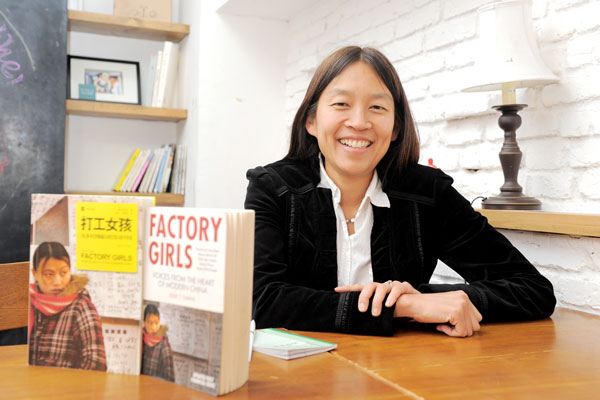
Most stories about migrant workers in China are about their struggles and how they have been exploited. A former Wall Street Journal reporter has written a book that gives a different perspective. Zhang Kun speaks to the writer Leslie Chang about her book Factory Girls.
Leslie Chang could hardly wait for her Chinese friends Min and Chunming to read the book she wrote about them.
 |
|
US author Leslie Chang admits Chinese migrant workers' conditions have improved gradually, during her recent trip to Shanghai to promote the Chinese edition of her Factory Girls. Cao Zichen / For China Daily |
Chang's book Factory Girls traced two migrant workers' life and struggles in Dongguan, a manufacturing city in Guangdong province.
The book won high acclaim in the United States and other parts of the world, and has been translated into more than 10 languages since it was published in 2008.
In April, it was published in simplified Chinese by Shanghai Translation Publishing House.
To coincide with the publication, Chang visited China in early April to introduce the new book, sharing with readers in Beijing and Shanghai her stories about China's migrant workers, particularly her experiences in Dongguan, a labor-intensive factory city in south China.
According to the editor Zhang Jiren, 30,000 copies were published in the first printing and were sold out within a week.
"Migrant workers have come to the limelight in the recent years, but such enthusiastic response from the public is still unexpected," he says.
Besides urban readers, migrant workers have shown wide interest in the book.
They attended Chang's meetings in Beijing and Shanghai. Many asked detailed questions and were eager to share their stories with the author and the public.
Media coverage has been overwhelming, too, with many publications dedicating a whole page to discussions.
Not all opinions were positive. Some criticized Chang for defending capitalism and endorsing multinational corporations in their exploit of workers.
According to Chang's observation, workers' conditions have improved gradually. The minimal salary level has gone up by 2.5 times since the book was first published. The new generations of workers are more demanding and are getting better treatment.
But the migrant phenomenon has not changed. The largest migration in the human civilization is still continuing, Chang says.